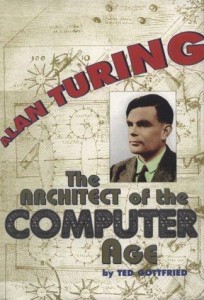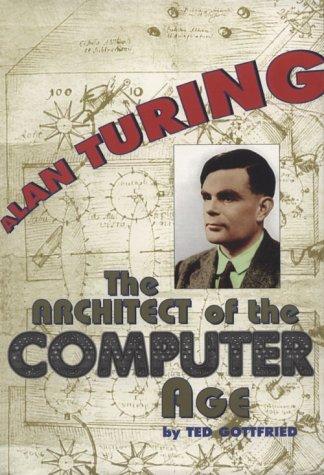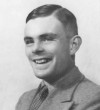
Today is the 100th anniversary of Alan Turing’s birth. I figured that since I’d procrastinated more than 2 years over writing my Turing review, I should do it today to make it look deliberate. Though I only have a little more than an hour left to go in June 23rd. And technically June 23rd is over in the UK. But we’ll ignore that!
Back when I was originally supposed to do this review, I had chosen a book called The Man Who Knew Too Much by David Leavitt. I tried reading this book. Then a long time later, I tried again. Then I just had such a block against even trying that I let it sit around and sit around. Finally about a month ago, I thought I’d look up what my other options are. There are surprisingly few books all about Turing. And no children’s books I could find. I borrowed two through interlibrary loan. One was a hefty textbook-looking thing. I didn’t even crack that one open. The other was Alan Turing: The Architect of the Computer Age by Ted Gottfried and written for a YA audience.
Finally, a book I could get through!
The problem with the Leavitt book was it was too dry and full of footnotes. Of course I’ve read dry things with footnotes before, and it’s fine if the subject is interesting enough, as Alan Turing certainly should’ve been. But it also suffered from a lot of time-jumping that was driving me up the wall. It was pretending to be chronological, but the author kept inserting comments about how this and that and the other thing would happen later. I just wanted a nice story about his childhood and time in school and everything that follows after that.
The YA book gave me that. There are a few spots where there’s a comment inserted. Like, spoiler alert, he’s going to get into running eventually, with Olympic potential. But it happened much less frequently.
I wouldn’t call this book eminently readable; I have read much better, more enjoyable nonfiction. In fact at first it was reminding me of school history books and I was thinking ‘no wonder I found history boring’. But once I got used to the style, it was fine. Plus the subject matter was very interesting.
I had watched, years ago, (even before this review was originally due), the docudrama, “Breaking the Code”, about Alan Turing. It’s great and I highly recommend watching it. In fact I intend to watch it again before the weekend is out.
What I failed to get a sense of from the movie that I got from the book was just how geeky a kid he was. In a time and place where it was not very nice at all to be a geeky boy (there are many times and places like that, of course). It also surprised me to learn just how absent his parents were. It’s not that they dumped him at boarding school, which you sort of expect, but they weren’t even in the country for large portions of his childhood. He’s still a toddler and they’ve both gone back to India. And not even left him with grandparents or aunts and uncles. Even when his father’s job in India is over, the two of them move to France! It’s just so bizarre to me.
The book does a pretty good job of explaining Turing’s accomplishments in mathematics, biology, and of course computer science in a way that’s understandable to me, and probably understandable to most high school students. It also doesn’t shy away from talking about his evolving identity as a gay man and his relationships with other boys and men, and one woman. I didn’t feel like the book was leaving things out to protect the Impressionable Youth ™.
Several times Gottfried referenced the biography by Andrew Hodges. K read and reviewed that book, if you’d like to read her review.
Halfway through the book, I stumbled upon photos. I hadn’t realized there were photo pages in the middle. I never like photo pages being in the middle of the book. I might like to see a picture of Turing as a child, while I’m still reading about his time in school. And then I get to the photos and start looking at them, and then there’s spoilers! It happened with Neil deGrasse Tyson’s book too. So I refrained from looking and went back later, after finishing the book.
The author describes the adult Turing as ‘unhandsome’, but I don’t see that. Maybe it’s the 50’s hairstyle that makes him look like the typical handsome dark-haired man. Or maybe I don’t know what ‘handsome’ means. In a group photo, I can see a little more what the author’s talking about. But I still don’t see him as looking geeky or mad scientist-like. The author a couple of times refers to his appearance or laugh as like a mad scientist.
I paused in the descriptions of a Turing machine to play a second time with today’s Google Doodle. I don’t know if either helped me understand the other more, but it was a nice break from reading.
Turing’s birthday anniversary is only today, but Gay Pride Month lasts until June 30th. So take the opportunity to read or watch more about Alan Turing. He’s an important part of science history and an important part of gay history.



